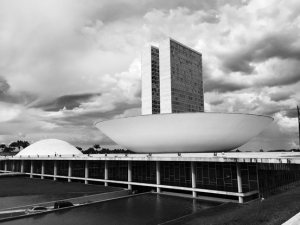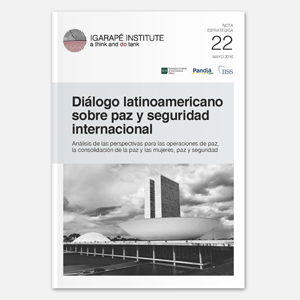Latin American Dialogue on International Peace and Security
Reviewing the prospects for peace operations, peacebuilding and women, peace and security
May 10 – Strategic Note 22
 The UN is reforming itself to better confront new and emerging peace and security challenges in the twenty-first century. A series of reviews have been undertaken to help the UN system take the right decisions. As the 70th UN General Assembly (UNGA) prepares to deliberate on these reforms, Igarapé Institute assembled governments and civil society groups from across Latin America to identify priorities and capacities to deliver on the evolving international peace and security agenda.
The UN is reforming itself to better confront new and emerging peace and security challenges in the twenty-first century. A series of reviews have been undertaken to help the UN system take the right decisions. As the 70th UN General Assembly (UNGA) prepares to deliberate on these reforms, Igarapé Institute assembled governments and civil society groups from across Latin America to identify priorities and capacities to deliver on the evolving international peace and security agenda.
A new report summarizes reflections emerging from a regional dialogue hosted by the Igarapé Institute in partnership with the Pandiá Calógeras Institute, the Norwegian Institute of International Affairs (NUPI) and the International Institute for Strategic Studies (IISS), at the Brazilian Ministry of Defense headquarters on 25 February 2016. A focus for the 30 participants representing government, think tanks and academia was examining Latin American perspectives on the UN peace operations review, the review of the UN peacebuilding architecture and the review of the implementation of UN Security Council Resolution 1325.
Representatives from Argentina, Brazil, Chile, Colombia, Guatemala, Mexico and Uruguay identified a series of priorities for the UNGA:
- Increase political and financial investment in conflict prevention – continue emphasizing the primacy of the political;
- Focus aid toward the so-called root causes of conflicts (from poverty and inequality to injustice and impunity);
- Ensure a gender perspective at all levels of all UN policies and programs;
- Avoid securitizing and militarizing development assistance; but ensure security and development initiatives are strongly linked and complement each other;
- Clarify distinctions between peacekeeping, peacebuilding and the women peace and security agendas and priorities associated with counter-terrorism and organized crime;
- Promote systemic reform of the UN system (including Security Council reform) as well as emphasis on decentralizing UN assistance; and
- Adopt a comprehensive agenda with regards to mediation and capacity support.
The report was reviewed by core partners and is provided to the UN General Assembly as an informal set of reflections. They do not represent the official positions of the governments attending the dialogue.
Index
- Summary
- Peace operations
- Peacebuilding
- Women, Peace and Security
- Security and development nexus
View PDF



